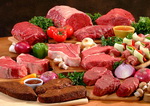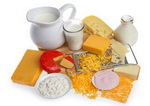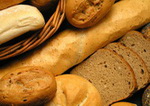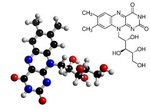|
Riboflavin – Its Dual Coenzyme RoleRiboflavin is another member of a family of B complex water soluble vitamins known as vitamin B2, and also gets its name from its yellow color. The vitamin also has coenzyme properties, and is in fact part of two coenzymes called flavin mononucleotide (FMN) and flavin adenine dinucleotide (FAD). Two of the key biochemical pathways that these coenzymes participate in are the citric acid cycle and the pathway that breaks down fatty acids.
Riboflavin Molecule and Chemical Formula
Dietary Recommendations The recommended dietary allowance (RDA) for men aged 19 years and older is 1.3 milligrams/day and for women 19 years and older is 1.1 milligrams/day. For women who are pregnant the RDA is 1.4 milligrams/day and for lactating women the RDA is 1.6 milligrams/day. Vitamin Sources Most plant and animal foods contain some riboflavin the vitamin is one of the four along with iron that are added to enrich grain products. Foods such as milk, milk drinks, and yogurt contain about 15%, bread and bread products contain about 10%, and ready to eat cereals contain almost the same amount as bread and bread products. Sources of the Vitamin 


Vitamin Deficiency Deficiencies of this vitamin are rare. Those primarily at risk for this vitamin deficiency are alcoholics, as well as those that have a long term abuse of barbiturates such as Phenobarbital. In addition, cancer, diabetes and heart disease may cause or worsen an existing deficiency of this vitamin.
Symptoms of a deficiency are signs around the mouth, the tongue becomes shiny and inflamed called glossitis; the mouth becomes painful and sore; the skin at the corners of the mouth becomes cracked; and the lips become inflamed and split. In addition, the glands that produce oil in the skin become clogged. As the symptoms progress anemia develops. The deficiency of this vitamin exists with other vitamin deficiencies. Vitamin Toxicity Due to the body’s ability to excrete excess vitamin, no known toxicity exists.
For other information on nutrition, and vitamins in particular some great references are: • Nutrition – Fourth Edition by Paul Insel, Don Ross, Kimberley McMahon, and Melissa Bernstein
Vitamins
|






